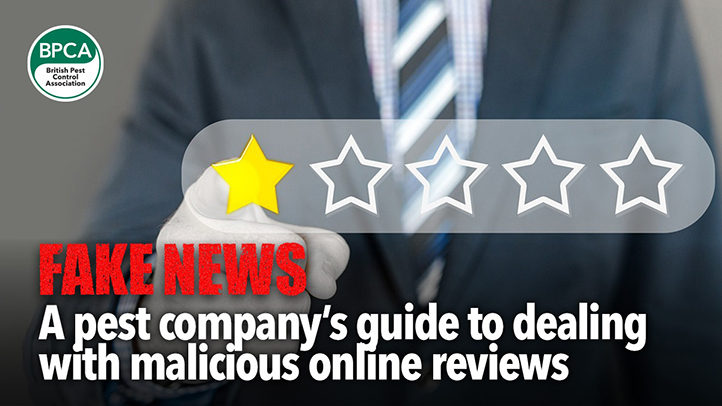The British Pest Control Association (BPCA) has published guidance to help pest management companies respond to fake or malicious reviews posted online.
The advice, written by BPCA marketing manager Scott Johnstone, looks at how Google and Facebook handle complaints, what the law says in different parts of the UK, and why a professional response often matters more than the review itself.
“Fake reviews sting,” Mr Johnstone said. “They can damage your reputation and, over time, your bottom line. That’s why it’s important to know the difference between a customer’s genuine negative opinion and a malicious or fabricated post designed to undermine your business.”
Platforms and processes
Google reviews carry significant weight, particularly when customers search “pest control near me”. BPCA explains that Google has a reporting process for reviews that break its policies, although unfair or one-sided feedback won’t usually be removed. Persistence, the guidance notes, often pays off.
On Facebook, now operating under “Recommendations,” the reporting system is less structured. Companies can challenge posts that count as harassment, hate speech or misinformation, but response times and outcomes are inconsistent. Unlike Google, Facebook allows businesses to switch reviews off entirely, though this also hides positive feedback.
What the law says
The guidance also outlines how defamation law differs across the UK. In England and Wales, companies must prove “serious harm” under the Defamation Act 2013, often linked to financial loss. Scotland applies a similar test through the 2021 Defamation and Malicious Publication Act, while Northern Ireland retains common law libel.
Legal action, BPCA stresses, is rarely proportionate for a single fake review, but persistent campaigns may justify escalation. Members can access free advice through BPCA Quest.
Professional responses
BPCA stresses that while removal processes run their course, companies should focus on their public reply. Calm, professional responses show other readers that the business is reasonable and credible. Templates are provided, including one that highlights BPCA membership, EN 16636 certification and access to the Association’s Alternative Dispute Resolution scheme.
Building resilience
The best defence against malicious reviews is a strong base of genuine positive ones. BPCA recommends encouraging happy customers to leave feedback, documenting evidence of malicious posts, and maintaining persistence when reporting issues.
Mr Johnstone said that malicious reviews are “frustrating but not unbeatable” and reminds companies that empathy in replies can often make the difference.
BPCA members can also access tailored marketing support, including advice on managing Google profiles and strengthening online reputation, by contacting [email protected].
The full guidance is available to all pest professionals, by clicking here.


